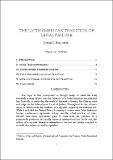| dc.description.abstract |
The topic of this Colloquium in Perugia brings to mind the early twentieth-century debate over the existence of a Latin American international law. It recalls, in particular, the work of Alejandro Alvarez, the Chilean jurist and judge on the International Court of Justice. Throughout his life, Alvarez strove to demonstrate the existence of a regional, American international law. While it included the United States, its principal sources were Latin American treaties, conferences, diplomatic history, and the actual practices of states. Alvarez had many opponents quick to underscore the paradox of a purportedly particular, yet equally universal, international law. In the end, the notion of a separate American international law was not widely accepted as accurate description or worthy aspiration |

